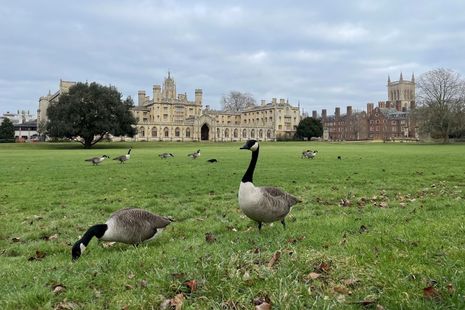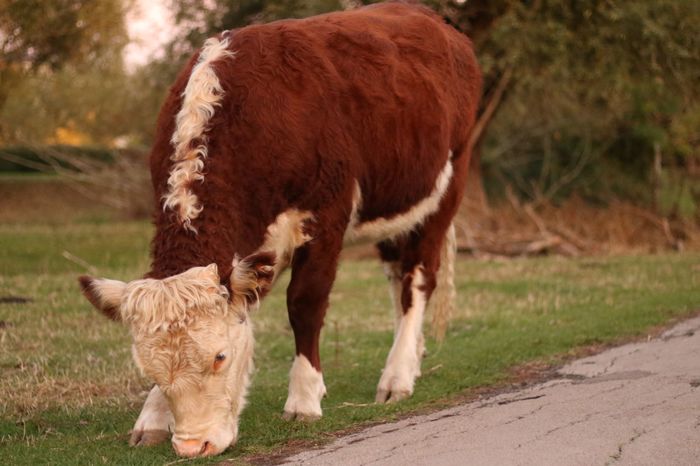Finding peace in geese is the perfect exam stress release
Tabitha Smith details her varied experiences with geese in Cambridge, and how they provide a chance for mindfulness in the throes of exam term

My palm outstretched beside the Clare College punt jetty, I find some friends in two Canada geese. One eyes me with familiarity, for I recognise the white markings on her neck: this is Cindy. The other goose nuzzles his beak into the seed I have presented, after filling the Cam with a vocally impressive ‘honkcore’: this is most definitely Charlie. A group of freshers descend the steps with their blindingly-yellow punt equipment in hand. “Oh my God, ducks!” they squeal. It seems the undergraduates of our time are both miseducated on common species of waterfowl, and how friendly they can turn out to be.
Since I arrived in Cambridge in 2021, Canada geese have been my solace. Most of my clothing features emblems of geese, I carry seed in my bag at all times, and I have even been termed the “goose whisperer” of Cambridge by the Chapel Wardens of Clare College – a community who knows all too well of my love for these feathered friends. Easter term is no exception. In this term of intense disquiet, aside from the looming silence of the library barricade, we so desperately search for peace within our endless stacks of revision notes. As the punt congestion grows ever heavier, gaggles seek for a channel away from the distress of the river. Perhaps it is in this channel – between the stress of both student and goose – that we can join together in a moment of peace.
“We so desperately search for peace within our endless stacks of revision notes”
It is worth noting that geese are unfairly stereotyped as being vicious and aggressive, with most goose critics turning to the ‘fact’ that they have teeth on their tongue. But if these critics really knew their geese, they would know that this is a fabrication. Geese are only as aggressive as we make them out to be. If you approach a goose and he hisses, it is most likely that he is protecting his female, so one cannot be too offended. But if you match their energy, if you are calm in your approach and give them the space they need, you will be sure of a mirrored reception. However, it should go without saying, do not approach geese if they have goslings, unless you want a trip to the emergency room!
On the topic of goslings, I questioned a Trinity College Porter about his opinion, and he noted that the babies “make for a good photo opportunity”. It is hard to deny this: the spring has birthed four adorable goslings who like to rest on the backs opposite the Wren Library where they totter around the grass and relax in the sun. Eager to meet the new arrivals and snap some pictures, I caught the attention of the parents with my seed. They began to approach me cautiously. However, the parents made it very clear to me they were still in full protective mode, with the father bobbing his neck up and down in warning. In haste, I had to abandon my rucksack and seed as the family approached the pathway, of which no one could cross without being threatened, undeniably an inconvenience for passers-by. However, being the goose-whisperer I am, I managed to reclaim my bag with much pride.
As the parents retreated from the path once the seed was gone, I spotted that a gosling was left behind, and I wasn’t the only one to notice: a crow, who had been following the family for the last hour, quickly saw it too and took his chance. He surged forward and knocked the baby over with his beak, pecking at it incessantly. Now it was time to take my chance. With a loud shout that caught the attention of the parents, I alerted them, they drove the crow away, and the baby swiftly ran back towards the comfort of his mother’s wings. I slept well that night knowing that a gosling was saved with a full stomach.
“The babies ‘make for a good photo opportunity’”
While geese can be aggressive when protecting their goslings, they are otherwise gentle birds. The largest gaggle I have fed in Cambridge is 27 geese on St John’s backs. They usually form an orderly circle around me, and I have had no problem sitting between them, holding out two palms for them to feed off. Some with which I have formed a real attachment have even let me stroke their feathers. This is not to say I have had no difficulties: I have been reprimanded by King’s Porters for feeding geese by the water’s edge; I have received confused looks from students and members of the public; and there are often days when the geese do not turn up. But it is worth the idyllic scene that inevitably comes: a student sat among some of the only friends she has in an otherwise bustling city, the sun descending into slumber against a pale blue canvas, both woman and bird finding peace in the other’s company as the crickets chirp.
Geese provide the sense of calm that we all search for. While I was talking to Hannah Fytche, Clare’s Decani Scholar, about these feathered friends, she mentioned that in the Mary Oliver poem, ‘Wild Geese’, “[Oliver] evokes the sound of ‘wild geese’ to affirm that we each have a ‘place in the family of things’. We are each good enough just as we are, and we each will find the path ahead of us unfolding as we go. Definitely a message we need during exam term!”. When you see geese around the University from this point onwards, be reminded that a moment of tranquillity can occur when we least anticipate it. They are the poster-birds for hope and reflection.
Geese have been my life. I grew up with a gaggle as a young girl, and they fill many of my childhood memories, including when some of the females would sit on my mum’s lap when she gardened, or when my dad would hold them up to clip their wings. Where once I may have been scared of them, now I embrace all that they have to offer. Especially in exam term, they offer me a moment’s quiet in exchange for a bag of mixed seed. But relationships are formed, and geese never forget those who have been kind to them. For, when I feed my Cambridge geese, just for a moment, I return to the safety and ease of my childhood. For a moment, I have no exams. For a moment, I can be that little girl again who opens the barn hatch in the early hours, running away with a mix of adrenaline, fear, and excitement to avoid being pecked at. And now I anticipate every morning upon Clare’s punt jetty, patiently waiting to be a child again, waiting for them to fly over to the sanctuary we have built over the years.
 News / Colleges charge different rents for the same Castle Street accommodation2 March 2026
News / Colleges charge different rents for the same Castle Street accommodation2 March 2026 News / King’s hosts open iftar for Ramadan3 March 2026
News / King’s hosts open iftar for Ramadan3 March 2026 Theatre / Lunatics and leisure centres 4 March 2026
Theatre / Lunatics and leisure centres 4 March 2026 News / Angela Merkel among Cambridge honorary degree nominees27 February 2026
News / Angela Merkel among Cambridge honorary degree nominees27 February 2026 News / News in Brief: waterworks, wine woes, and workplace wins 1 March 2026
News / News in Brief: waterworks, wine woes, and workplace wins 1 March 2026








